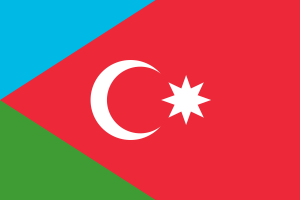Language/South-azerbaijani/Grammar/Noun-Plurals
| ◀️ Possessive Pronouns — Previous Lesson | Next Lesson — Family Members ▶️ |
Introduction[edit | edit source]
Welcome to the lesson on noun plurals in South Azerbaijani! In this lesson, we will explore how to form plurals of nouns and use them in sentences. Understanding noun plurals is essential for building your vocabulary and expressing yourself accurately in South Azerbaijani. By the end of this lesson, you will be able to confidently form and use noun plurals in various contexts. So let's get started!
Formation of Noun Plurals[edit | edit source]
In South Azerbaijani, forming noun plurals is relatively straightforward. While there are some irregular nouns, the majority of nouns follow a consistent pattern when forming their plurals. Let's take a look at the different ways to form noun plurals in South Azerbaijani:
Adding "-lar" or "-lər"[edit | edit source]
The most common way to form noun plurals in South Azerbaijani is by adding the suffix "-lar" or "-lər" to the singular noun. The choice between "-lar" and "-lər" depends on vowel harmony rules, which we will cover in a future lesson. For now, let's focus on the general pattern of adding these suffixes.
Here are some examples:
| South Azerbaijani | Pronunciation | English Translation |
|---|---|---|
| kitab | [kiˈtab] | book |
| kitablar | [kiˈtabˈlar] | books |
| qadın | [qaˈdɯn] | woman |
| qadınlar | [qaˈdɯnˈlar] | women |
| otaq | [oˈtaq] | room |
| otaqlar | [oˈtaqˈlar] | rooms |
As you can see, the plural form is created by adding "-lar" or "-lər" to the end of the singular noun. This plural suffix is used for both masculine and feminine nouns.
Adding "-nın" or "-nin"[edit | edit source]
Another way to form noun plurals in South Azerbaijani is by adding the suffix "-nın" or "-nin" to the singular noun. This plural suffix is typically used for nouns ending in a vowel or certain consonants.
Here are some examples:
| South Azerbaijani | Pronunciation | English Translation |
|---|---|---|
| ev | [ev] | house |
| evlər | [evˈlər] | houses |
| qız | [gɯz] | girl |
| qızlar | [gɯzˈlar] | girls |
| balaca | [baˈlatʃa] | child |
| balacalar | [baˈlatʃaˈlar] | children |
In these examples, the plural suffix "-nın" or "-nin" is added to the singular noun, creating the plural form.
Changing the Vowel[edit | edit source]
In some cases, forming the plural of a noun involves changing the vowel sound in the singular noun. This vowel change is often accompanied by adding a suffix or modifying the word in other ways. Let's look at some examples:
| South Azerbaijani | Pronunciation | English Translation |
|---|---|---|
| göz | [ɡœz] | eye |
| gözlər | [ɡœzˈlər] | eyes |
| ayaq | [aˈjaq] | leg |
| ayaqlar | [aˈjaqˈlar] | legs |
| oğul | [oˈɣul] | son |
| oğullar | [oˈɣulˈlar] | sons |
In these examples, the vowel in the singular noun changes when forming the plural. This vowel change is an important aspect of forming noun plurals in South Azerbaijani.
Cultural Insights[edit | edit source]
The formation of noun plurals in South Azerbaijani reflects the rich cultural and linguistic heritage of the region. South Azerbaijan has a diverse population with various ethnic groups, each contributing to the linguistic landscape of the region. As a result, South Azerbaijani has borrowed words from different languages, leading to a diverse range of noun plurals. Additionally, historical influences from Persian, Arabic, and Turkish have also shaped the formation of noun plurals in South Azerbaijani.
For example, the suffix "-lar" or "-lər" used to form noun plurals in South Azerbaijani is similar to the plural suffix "-lar" or "-ler" in Turkish. This similarity can be attributed to the historical and cultural connections between the two regions. Similarly, the use of the suffix "-nın" or "-nin" in certain cases reflects the influence of Persian on South Azerbaijani grammar.
Understanding the cultural and historical context behind noun plurals enhances your language learning experience and allows you to appreciate the richness of South Azerbaijani culture.
Practice Exercises[edit | edit source]
Now it's time to practice what you've learned! Complete the following exercises to reinforce your understanding of noun plurals in South Azerbaijani.
Exercise 1: Forming Noun Plurals For each singular noun given below, write the corresponding plural form in South Azerbaijani.
1. kitab 2. qoyun 3. gül 4. ata 5. uşaq
Solution: 1. kitablar 2. qoyunlar 3. güllər 4. atalar 5. uşaqlar
Exercise 2: Using Noun Plurals Translate the following sentences from English to South Azerbaijani, using the appropriate noun plurals.
1. The birds are singing. 2. I have two cats. 3. She bought five dresses. 4. We need more chairs. 5. They have many friends.
Solution: 1. Quşlar söyləyir. 2. Mənim iki pişikim var. 3. O beş paltar aldı. 4. Bizə daha çox stul lazımdır. 5. Onların çox dostu var.
Conclusion[edit | edit source]
Congratulations! You have successfully completed the lesson on noun plurals in South Azerbaijani. In this lesson, you learned how to form noun plurals by adding suffixes, changing vowels, and understanding the cultural nuances behind noun plurals in South Azerbaijani. The ability to form and use noun plurals is crucial for expanding your vocabulary and expressing yourself accurately in South Azerbaijani. Keep practicing and exploring the language to further enhance your language skills. Good luck!
Other Lessons[edit | edit source]
- Give your Opinion
- Present Tense
- How to Use Be
- Comparatives and Superlatives
- Subject Object Verb Order
- Possessive Pronouns
- Adjective Agreement
- Negation
- Pronouns
Template:South-azerbaijani-Page-Bottom
| ◀️ Possessive Pronouns — Previous Lesson | Next Lesson — Family Members ▶️ |

